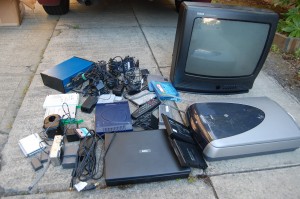Tonight I heard a superb opinion piece by Dr Moira Gunn, host of the weekly radio show TechNation. She notes the political debate over NASA’s budget and President Obama’s new vision for the agency.
The proposed annual budget for NASA is only $19 billion … and do you know what we spend in Iraq every single day? $7 billion.
That’s right. Three days from now, we will have spent on Iraq the entirety of next year’s budget for NASA, and then some. Obama’s proposal to increase the budget of NASA by $6 billion over the next five years, really says that in half-a-decade, NASA will receive one more day in Iraq. (Yes, try to contain your enthusiasm.)
Gunn advocates a much larger investment, both in NASA and in science education & innovation in general—advocacy best championed by a government. Fifty years ago, President Kennedy’s leadership was critical in pushing the country not just towards the Apollo moon program, but towards excellence in science. The United States definitely needs another inoculation of science excellence now.
My angle on NASA’s vision is this: the current debate seems to hinge on whether we’re going back to the Moon, or to Mars—and whether various communities around the country will retain their aerospace industries that work to put humans in space. I wish human space flight weren’t such a political flash point, because it’s not where NASA should direct its energies.
Human space travel is very expensive, and very dangerous. There is, of course, the risk of accidents, such as those to the Challenger and Columbia, but the chief danger in space is cosmic radiation. A trip to the Moon takes about two weeks, but these days people are talking about going to Mars. A manned mission to Mars would take two-and-a-half years, because Mars is so far away. That’s a 2-1/2-year dose of cosmic radiation for each astronaut, and there’s no way to shield it.
Unmanned interplanetary missions have been enormously successful (Mars Rovers, Cassini, Galileo, Ulysses), and several others are en route to their destinations with all systems go (Messenger, New Horizons, Dawn), demonstrating without a doubt the value of further robotic missions. I remain skeptical of the feasibility of manned missions, not only because of their cost, but of the political fallout from the inevitable accidents and loss of life. The age of easy and ubiquitous space flight is still far in the future.
So how about we give NASA a few extra days in Iraq?

